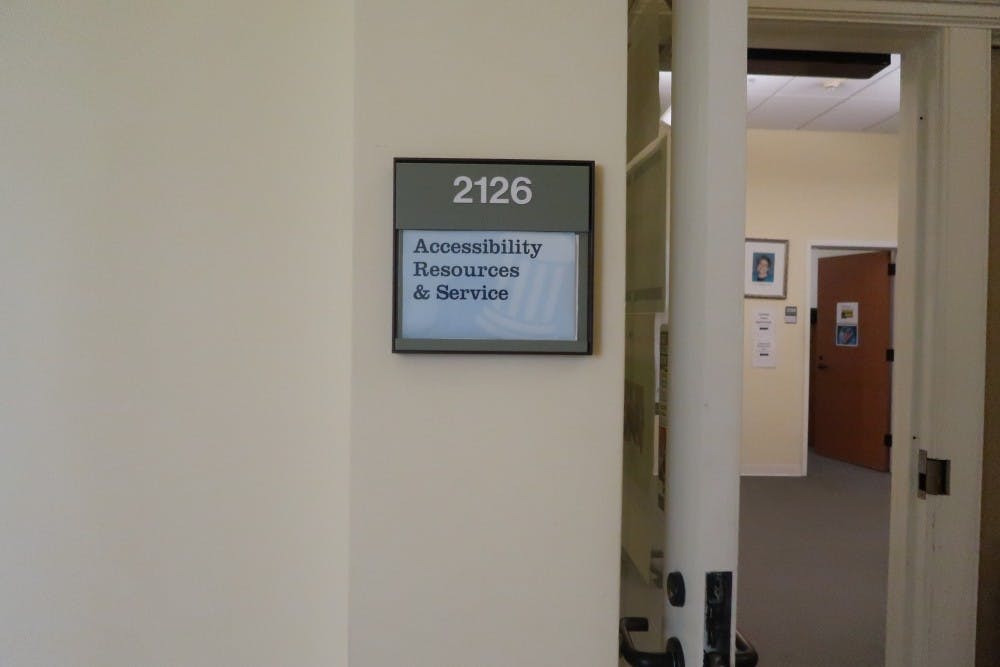But once Larrauri started classes, she found herself waiting on class materials from the ARS office and in some cases was denied the material she requested.
She started French 101 having requested a Braille textbook for the course. She received an electronic version instead after being promised Braille resources previously.
She said she made do with the electronic versions of her class materials but even those she did not receive on time. They would arrive late and sometimes on the day the material was due. Sometimes her class materials would not be formatted correctly which made understanding the readings alone nearly impossible.
“If they had footnotes in English, the footnotes would be randomly placed, and a lot of the words wouldn’t have transferred correctly,” she said. “So there were symbols showing up that were supposed to be accented words that didn’t show up as such. My friends had to basically help me read some of the text.”
Bailey said the ARS office does its best to ensure students have the specific materials they need for classes and will often outsource materials if the office cannot provide them themselves.
“We believe there is a responsibility to be able to do that in a timely format or provide an alternate form of access until we’re able to get the vendor relationship set,” Bailey said.
When Larrauri did not receive her textbook for a geology course until near the day of the exam, she knew she had to transfer. The book was not in Braille as she had requested and was full of images she could not see without the help of a reader.
“I was told, ‘Well, you know, just have a partner or somebody describe those images to you,’” she said.
While at UNC, Larrauri said she went in person to the ARS office to speak with an employee, and the office was not receptive to her requests.
Bailey said the ARS office periodically gets complaints from students, and she recommends that students who have issues meet with her or another staff member to address their concerns as part of the accommodation appeal process.
“If a student comes to us with a particular complaint, we investigate it, we look at what we could be doing to better assist this student," she said. "We make modifications to our processes and procedures based on that kind of feedback."
The ARS office is in the process of writing new policies that will address student concerns about class material allocation and timelines for accommodations. Bailey said those policies will be released in the spring.
To get the day's news and headlines in your inbox each morning, sign up for our email newsletters.
Larrauri said the ARS office at UNC is too small to handle the volume of student needs and requests.
“If you compare the sizes of the campuses, JMU and UNC, they are both relatively similarly sized,” she said. “If you compare the sizes of the disability offices, they are not relatively similarly sized.”
Kevin Currin, a third-year graduate student studying bioinformatics, is legally blind and needs class materials in a variety of formats. He said he used the ARS office’s resources more as an undergraduate student and had an overall positive experience with them.
“They were always pretty good at getting the things that I needed,” he said. “It would sometimes take a little while to get my textbooks into a different format, but that’s understandable. In a lot of cases, they had to create them themselves.”
When there were delays in getting his books, he got them chapter-by-chapter and week-by-week. He said the short delays did not hold him back in his schoolwork.
The only issue he had was with ARS-designated testing rooms which could get crowded during midterm and exam periods to the point where the lines would be out the door.
“I think they need more resources from the University overall,” he said.
Katherine Hubbard, a senior studying psychology and Hispanic literature and culture, said she uses the office’s resources for extended time on tests due to slow processing speed and ADD. She said that she thinks the ARS office does its best to accommodate all the students who test there, but she still gets distracted when there are so many people testing at once.
“Everybody’s super packed together, so you can’t spread out a whole lot,” Hubbard said. “It’s a lot more claustrophobic.”
Bailey said the ARS office is open to hearing feedback from students on how to improve its services.
“We try to address all the concerns that students might have, and we welcome the opportunity for students to meet with us, to talk with us and provide us feedback about what they’re having in terms of challenges,” she said.
university@dailytarheel.com




